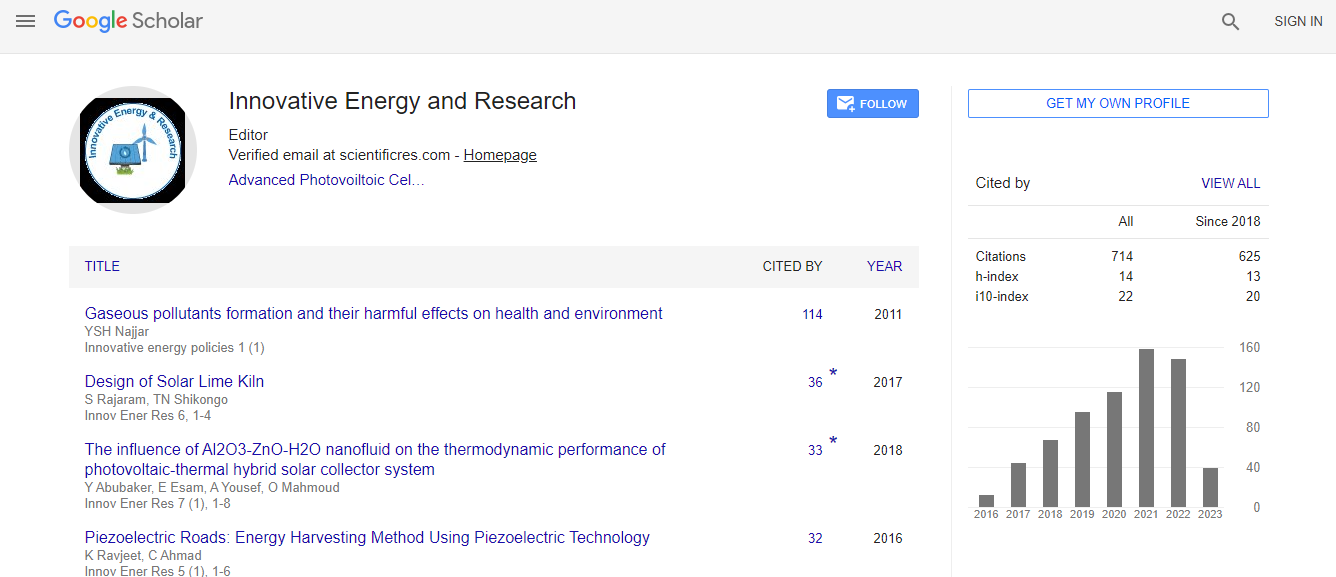Our Group organises 3000+ Global Conferenceseries Events every year across USA, Europe & Asia with support from 1000 more scientific Societies and Publishes 700+ Open Access Journals which contains over 50000 eminent personalities, reputed scientists as editorial board members.
Open Access Journals gaining more Readers and Citations
700 Journals and 15,000,000 Readers Each Journal is getting 25,000+ Readers
Google Scholar citation report
Citations : 712
Innovative Energy & Research received 712 citations as per Google Scholar report
Innovative Energy & Research peer review process verified at publons
Indexed In
- Google Scholar
- Open J Gate
- Genamics JournalSeek
- RefSeek
- Hamdard University
- EBSCO A-Z
- Publons
- Euro Pub
- ICMJE
Useful Links
Recommended Journals
Related Subjects
Share This Page
Effect of universal trimming on electrical characteristics of polymer thick film resistors
20th International Conference on Advanced Energy Materials and Research
Rambabu Busi, Y Srinivasa Rao and T.Satyanarayana
Lakireddy Bali reddy College of Engineering, IndiaAndhra University, India
Posters & Accepted Abstracts: Innov Ener Res
Abstract
Statement of the Problem: The purpose of this paper is to study high-voltage interactions in polymer thick-film resistors, namely, polyvinyl chloride (PVC)-Graphite thick-film resistors, and their applications in universal trimming of these resistors. Methodology & Theoretical Orientation: The authors applied high voltages in the form of pulses and impulses of various pulse durations and with different amplitudes to polymer thick-film resistors and observed the variation of resistance of these resistors with high voltages. Findings: The paper finds that high voltages can be used for trimming of polymer thick-film resistors in both directions, i.e. upwards and downwards. The practical implications of this paper is that one can trim the polymer thick-film resistors, namely, PVC–graphite thick-film resistors, in both directions, i.e. upwards and downwards, by using this method. Originality/value: The value of the paper is in showing that high voltages can be used to trim downwards and also upwards in the case of polymer thick film resistors. This type of trimming is called universal trimming, developed first time for polymer thick-film resistors. Findings: When high voltage pulses are applied to a polymer thick film resistor with a particular resistivity either it is higher or lower one, it leads to increase in resistivity with shorter pulse duration of high voltage pulses and decreases in resistivity with longer pulse duration of the applied high voltage pulses. This clearly shows that there is a phenomenon similar to local heating which arises due to high voltage and leads to micro-welding between the particles and breaking of the conducting paths. Therefore, the authors looked for a mechanism with local heating which can lead to decrease or increase in resistance with the application of a voltage. Conclusion & Significance: This paper describes some investigations carried out on the universal trimming method of polymer thick film resistors using high voltages. It is reported that there is a reduction or increment in the resistance with the application of high voltage beyond a certain (threshold) value which depends up on the value of the voltage and the effective duration for which it is applied. By using this process, the polymer thick film resistor can be trimmed both upwards and downwards which leads to universal trimming of these resistors, just by changing the effective duration of the applied high voltage pulses.Biography
E-mail: rams1315@gmail.com

 Spanish
Spanish  Chinese
Chinese  Russian
Russian  German
German  French
French  Japanese
Japanese  Portuguese
Portuguese  Hindi
Hindi 
